Identifying Anxiety Vs Panic Attacks: What You Need to Know?
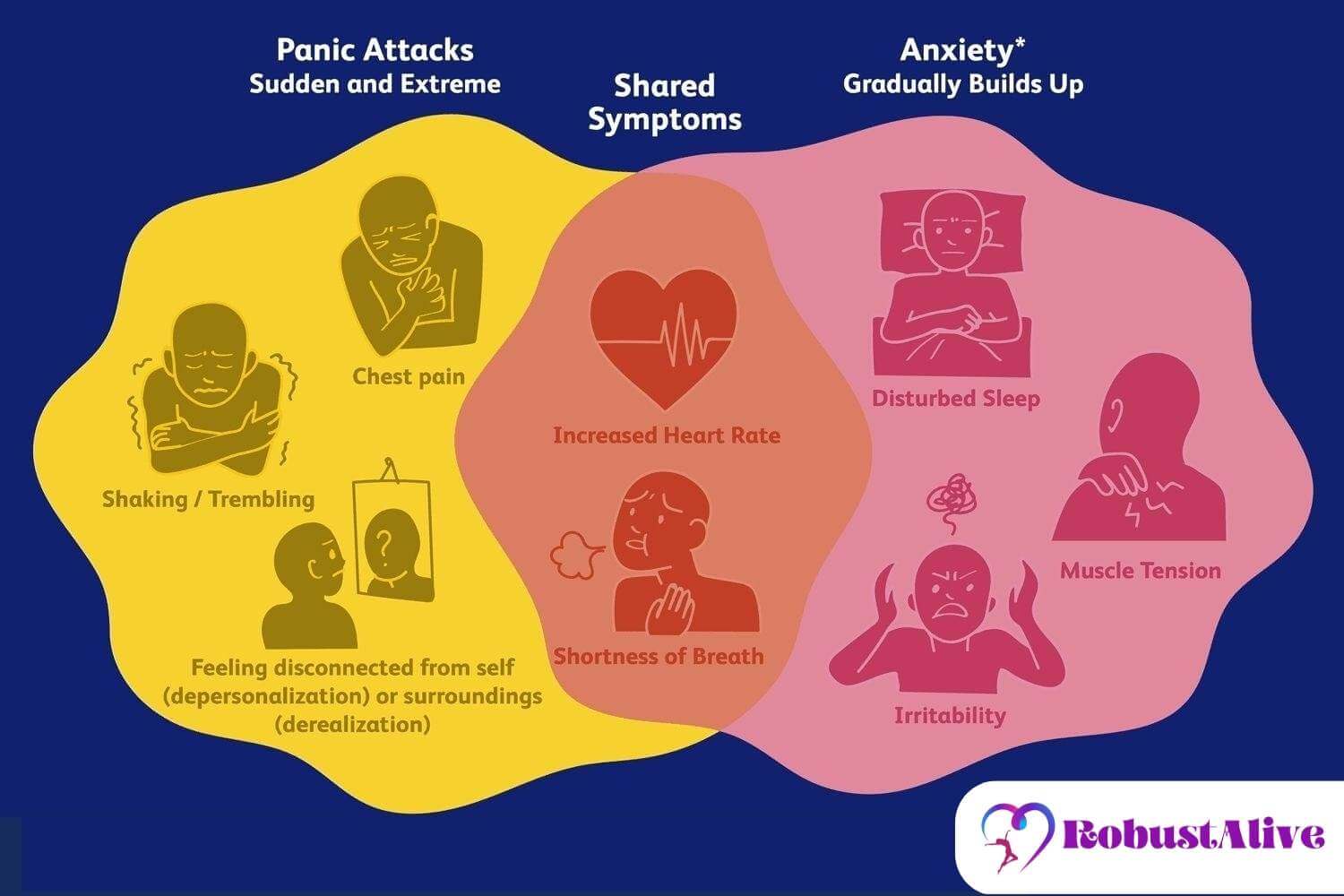
Anxiety and Panic attacks both make your heart beat fast, make you breathe shallowly, and make you feel uncomfortable. But the intensity and origin of each one are usually different.
So what are the differences considering anxiety vs panic attacks?
The key differences between anxiety and panic attacks are based on their severity, onset, and duration. Anxiety is triggered by some situations or circumstances. Over time this situation may get worse. On the other hand, Panic attacks occur suddenly with terrifying feelings. By maintaining a healthy lifestyle, these disorders can be prevented.
We are covering all the necessary information about anxiety and panic attacks that you should know. Get all the information by simply reading the whole article.
Anxiety VS Panic Attacks: The Key Differences
This table summarizes the key differences between anxiety and panic attacks.
|
Anxiety Attack |
Panic Attack |
|
| Symptoms | Chest pains, breathing difficulties, heart palpitation | Apprehension or worry, restlessness, disturbed sleep |
| Severity | Symptoms vary in severity, ranging from mild to severe. | Severe symptoms, often physical in nature, cause people to believe they’re losing control. |
| Onset | Symptoms become gradually more intense over a minute, hour, days, or even months at a time. | Often come ‘out of the blue’ with no warnings or triggers. |
| Duration | Symptoms can remain present for a long time. | Symptoms usually peak at around 10 minutes and then subside quickly. |
Understanding Anxiety
When you have anxiety that doesn’t go away, this meets the condition of anxiety disorder. This situation may get worse over time. The symptoms can make it hard to do things in daily life, schoolwork, job performance, and relationships.
Types & Causes of Anxiety
Anxiety disorders have complicated origins. Anxiety disorders can result from a variety of factors, some of which may not even be present unless another is visible.
Some possible explanations are:
- Relationship or family difficulties, as well as other environmental stressors
- Genetics
- Diseases and other medical considerations
- Drug side effects
- Substance withdrawal
Some people deal with anxiety so much that it interrupts their lifestyle. Most people have anxiety disorders that run through their genes. Females get anxiety disorders more than males.
Anxiety disorder varies from several conditions. Let’s discuss this.
- Agoraphobia
Fear or avoidance of situations or places that may cause you to panic or may feel trapped, embarrassed, and helpless.
- Anxiety disorder due to a medical condition
This is caused by a direct physical health problem.
- Generalized anxiety disorder
The anxiety and worry that don’t go away or are excessive, even about regular activities, routine issues,
or events.
- Panic disorder
involves periodic episodes of intense anxiety, fear, or terror that come on suddenly and reach their peak within minutes.
- Selective mutism
This is when kids don’t talk in certain places, like school, even though they can talk in other places, like within the house with close family members.
- Separation anxiety disorder
It is defined by anxiety that is too high for the child’s age and development level, and it is linked to separation from grandparents or other people who take on parental roles.
- Social anxiety disorder (social phobia)
Indicates an excessive amount of anxiety, fear, and avoidance of social situations.
- Specific phobias
Excessive fear or avoidance of specific objects, situations, or activities.
- Substance-induced anxiety disorder
Extreme anxiety or panic caused by drug usage, medicine use, exposure to harmful substances, or discontinuing drug use.
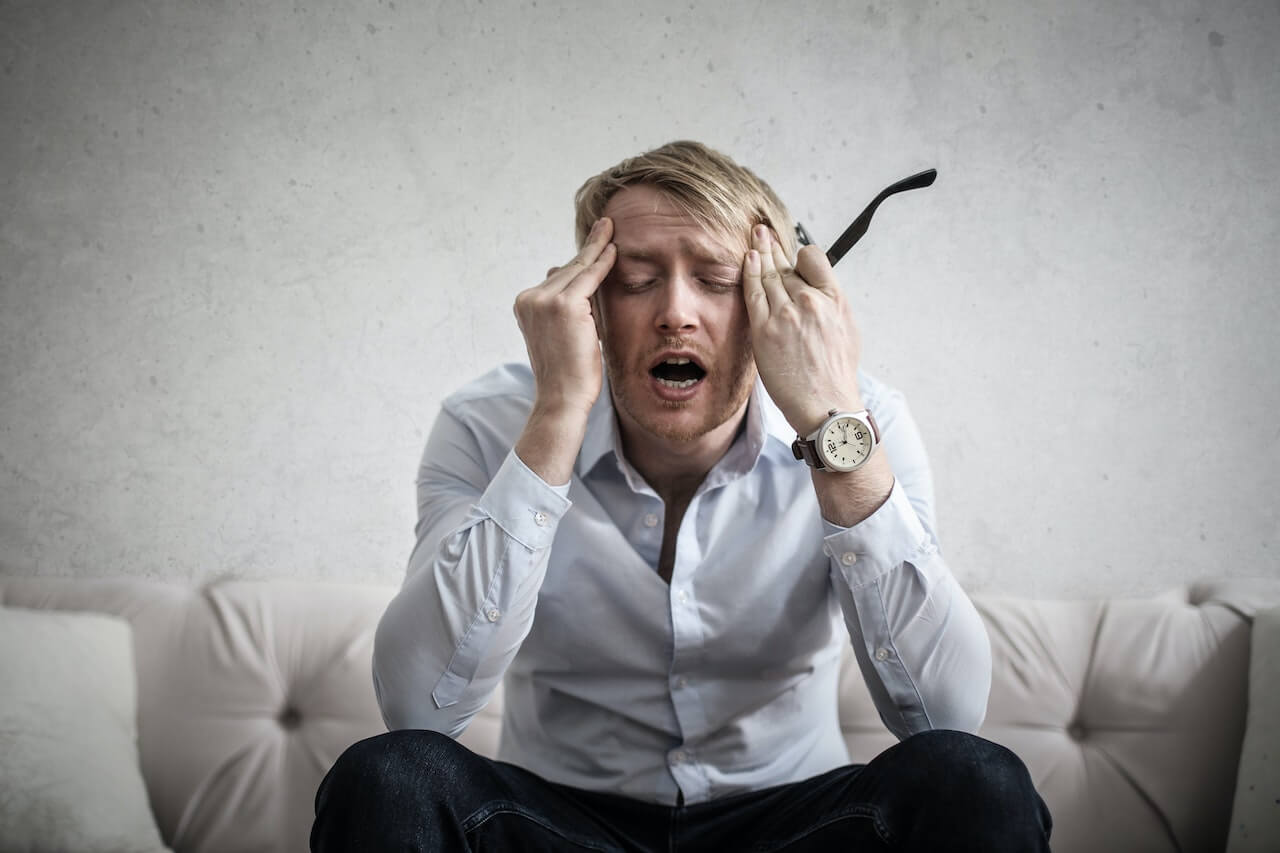
Photo by Andrea Piacquadio/Pexels
So what are the common symptoms of anxiety disorder? Let’s find it through this section of the article.
Common Symptoms of Anxiety
Typically, these symptoms are seen in people who have anxiety
- Feeling nervous
- Feeling helpless
- Feeling nervous, fidgety, or tense
- The feeling that danger, terror, or tragedy is coming
- Having a faster heartbeat
- breaths rapidly (hyperventilation)
- Sweating
- Trembling
- Feeling weak or tired
- Difficulty focusing or thinking about anything besides the present worry
- Trouble with sleeping
- Experiencing gastrointestinal (GI) problems
- Difficulty in controlling worry
- Obsessively thinking about the panic trigger
Read More: Type 2 Diabetes
Risk Factors for Anxiety
There are many reasons that make anxiety symptoms more severe. There are some potential risk factors for anxiety disorders listed by NIMH.
- Childhood shyness and other personality traits
- Growing up with traumatic events in the past
- Problems with mental health that run in the family
- Some bad physical conditions
Understanding Panic Attacks
A panic attack is a sudden and strong feeling of terror that causes strong physical responses even when there is no genuine risk or obvious reason. It is extremely terrifying to experience a panic attack.
One may think that he/she may be out of control during a panic attack. Also, he/she may feel like suffering a heart attack, or even about to die.
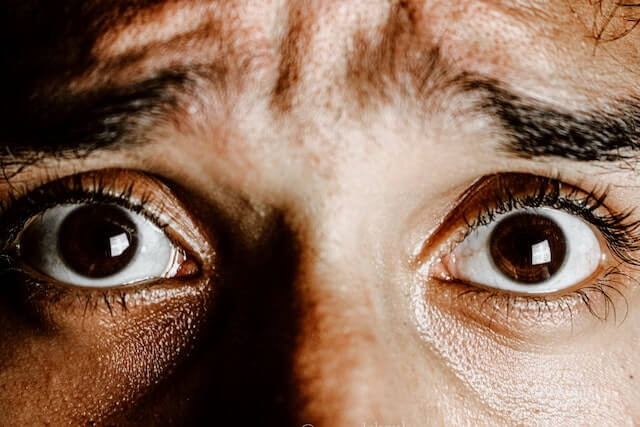
Photo by samer daboul/Pexels
Common Symptoms of Panic Attacks
Most panic attacks start suddenly and without warning. They can occur at any time.
There are several types of panic attacks. These symptoms are often present during a panic attack
- Sense of impending doom or danger
- Terrified of loss of control or death
- Rapid heart rate
- Sweating
- Trembling or shaking
- Shortness of breath
- Tightness in your throat
- Chills
- Hot flashes
- Nausea
- Abdominal cramping
- Chest pain
- Headache
- Dizziness, lightheadedness, or faintness
- Numbness or tingling sensation
- A feeling of unreality or being detached
Causes of panic attacks
At first, panic attacks may come on quickly and without notice, But over time they may trigger in certain situations.
Some factors may commonly play a role in causing a panic attack. These are
- Genetics
- Major stress
- A personality that is more sensitive to stress or more likely to negative emotions
- Changes to the way certain parts of your brain work
Risk factors
Some factors that might make you more likely to have panic attacks are:
- Panic attacks in family history
- Experiencing serious life stress
- Experiencing a traumatic event
- Significant life changes
- Excessive caffeine intake or smoking
- Evidence of childhood sexual or physical abuse
Now you know about panic attacks and anxiety. In this section of the article, we are going to discuss the key differences between panic attacks and anxiety
Differences Between Anxiety and Panic Attacks
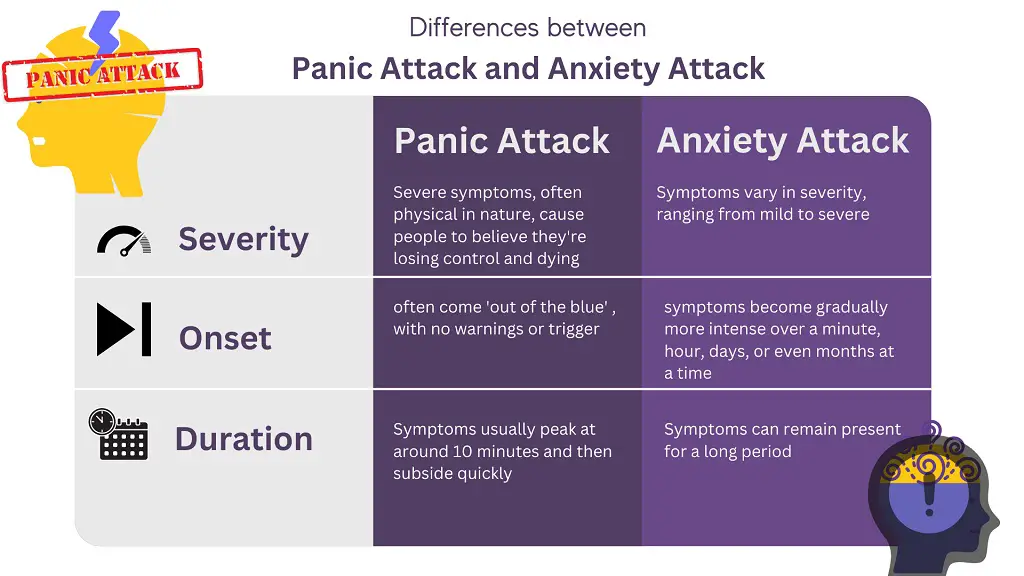
There are significant differences between panic attacks and anxiety attacks given below.
The severity of the symptoms: Symptoms of panic attacks are usually far more intense than anxiety attacks.
How long do the main symptoms last — panic episodes usually start rapidly and end swiftly. (usually peaking after around 10 minutes). Anxiety can build up over time and last for months at a time.
Similarities Between Anxiety and Panic Attacks
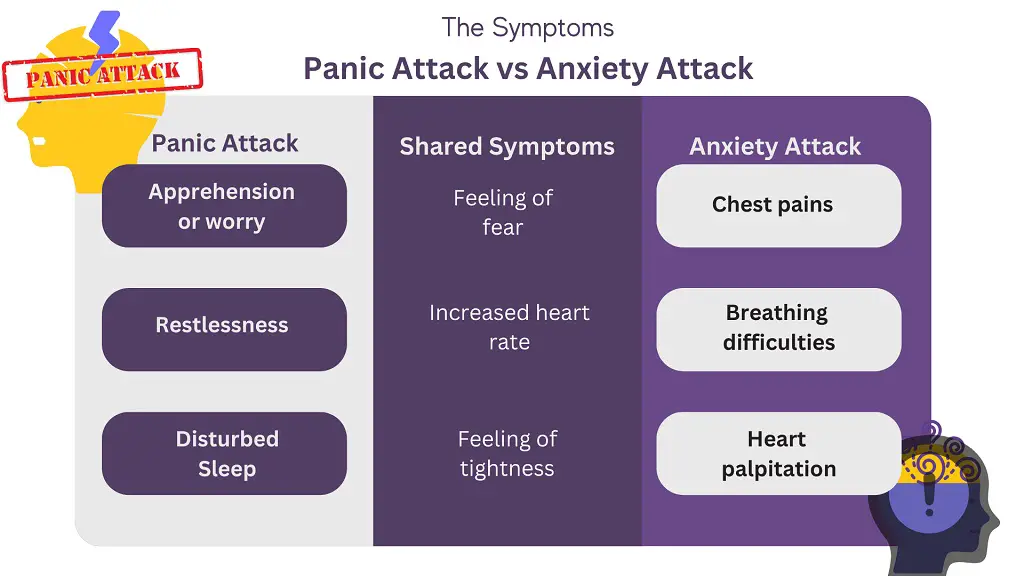
Prevention
It is hard to find what triggers anxiety disorder or panic attacks. If you already suffer from it, you should take measures to reduce its effects.
- Recognize and accept what you’re going through: If you are experiencing these disorders you will know how hard the situation is. You have to keep in mind that one day this hardship will go away and you will be ok.
- Practice relaxation techniques: Deep breathing, meditation & spiritual practices, and muscle relaxation can help you calm down when you’re feeling worried or panicked.
- Challenge negative thoughts: Anxiety and panic disorder can be caused by negative thinking. In this situation, you should ask yourself that is it true or not. This way you can challenge negative thoughts.
- Stay active: Regular workouts can help you to lessen the feelings of anxiety and stress. Even a 20-minute walk can be very beneficial.
- Get enough sleep: If you are not getting enough sleep anxiety and panic attack will get worse. You have to sleep at least 7-8 hours per night.
- Avoid caffeine and alcohol: Taking too much caffeine and alcohol can cause anxiety and panic disorder. You should stay away and cut down on these habits.
- Maintain a balanced diet: You should eat healthily and maintain a balanced diet.
- Talk to someone: Talk to a trusted friend, family member, or mental health professional can help you feel better and lessen your worry and panic.
- Join a support group that helps people having anxiety and panic disorders.
- Practice self-care: You should take to do the things that help you to enjoy. This thing can be anything like drawings, playing, or walking around the lakes.
Read More: How Doxycycline Ruined My Life?
When to Seek Professional Help
If a panic attack or anxiety disorder hampers your daily life you should seek a professional’s help. The doctor will provide you with suitable treatment options like meditations or some medications.
Also, these are some severe causes to seek professional help
- You’re struggling to get rid of it each day
- You’re having physical problems
- You’re having thoughts of suicide
- You’re turning to alcohol or drugs
- You’re avoiding people and places
Frequently Asked Questions (FAQs)
Should I go to the doctor if I keep having panic attacks?
You must go to a doctor. The doctor will ask you how frequently you experience them and how long you had them. The doctor will perform a physical test so that he can detect if the disorder occurred by something else.
Is panic disorder a serious mental illness?
Yes, a panic attack is a serious and isolating illness. It may create a gateway to enter other mental health disorders.
Can a panic attack damage your heart?
During a panic attack, a coronary artery spasm can be caused by both activations of the autonomic nervous system and hyperventilation (which can cause alkalosis). This can then cause myocardial ischemia and chest pain from the heart.
Conclusion
If panic attacks and anxiety disorders herm your daily life you should consult a doctor.
Finally, anxiety and panic attacks can make a person feel less confident as it affects their regular life. Anxiety and panic attacks are similar in nature, but they have some different triggering points, how severe they are, and how long they last. The best way to handle this is to maintain a healthy lifestyle.





